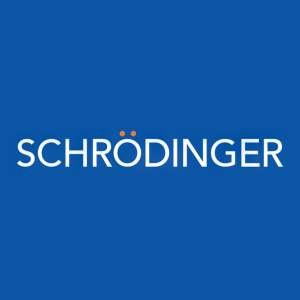Schrödinger Highlights Discovery of SGR-1505, Clinical-Stage MALT1 Inhibitor, at American Chemical Society National Meeting
The oral presentation provided an overview of how Schrödinger leveraged its computational approaches at scale to discover SGR-1505. Schrödinger’s platform enabled vast exploration of chemical space, triaging 8.2 billion compounds, synthesizing 78 of the most promising molecules in the lead series, and identifying SGR-1505 as the company’s development candidate in approximately 10 months. Reaching a development candidate can take three to six years and typically involves synthesizing up to 5,000 molecules per program.
“Designing the optimal molecule is a tremendous multi-parameter optimization challenge that requires balancing many key properties,” stated Aleksey Gerasyuto, Ph.D., head of medicinal chemistry at Schrödinger. “One of our goals in this program was to address the limitations reported with other MALT1 inhibitors. By leveraging our computational platform, our cross-functional team simultaneously and rapidly optimized key drug-like properties and designed several distinct chemical series, ultimately selecting SGR-1505 as our development candidate.”
“We believe SGR-1505 has the potential to be a best-in-class compound. The preclinical profile of SGR-1505, coupled with positive data from our recently completed Phase 1 study in healthy subjects, further increases our conviction about our MALT1 program,” said Margaret Dugan, M.D., chief medical officer at Schrödinger. “Our Phase 1 study in patients with relapsed/refractory B-cell lymphomas is progressing well, and we look forward to reporting initial data from the study in late 2024 or 2025.”
SGR-1505 Clinical Studies
Schrödinger is conducting a Phase 1 dose-escalation study in patients with relapsed/refractory B-cell lymphomas to evaluate the safety, pharmacokinetics, pharmacodynamics and preliminary signals of therapeutic activity of SGR-1505 as a monotherapy. The study is enrolling patients at multiple sites in the
Schrödinger recently completed a Phase 1 study showing that SGR-1505 was well tolerated in a Phase 1 study of 73 healthy volunteers. No drug-related serious adverse events or dose limiting toxicities were observed in the study. The data also confirmed target engagement, with greater than 90 percent inhibition of IL-2 secretion in activated T cells, a pharmacodynamic goal of the study.
About Schrödinger
Schrödinger is transforming the way therapeutics and materials are discovered. Schrödinger has pioneered a physics-based computational platform that enables discovery of high-quality, novel molecules for drug development and materials applications more rapidly and at lower cost compared to traditional methods. The software platform is licensed by biopharmaceutical and industrial companies, academic institutions, and government laboratories around the world. Schrödinger’s multidisciplinary drug discovery team also leverages the software platform to advance a portfolio of collaborative and proprietary programs to address unmet medical needs.
Founded in 1990, Schrödinger has approximately 850 employees and is engaged with customers and collaborators in more than 70 countries. To learn more, visit www.schrodinger.com, follow us on LinkedIn and Instagram, or visit our blog, Extrapolations.com.
Cautionary Note Regarding Forward-Looking Statements
This press release contains forward-looking statements within the meaning of The Private Securities Litigation Reform Act of 1995, including but not limited to those regarding the potential advantages of our computational platform, our research and development efforts for SGR-1505, the timing, progress, and results of clinical trials of SGR-1505, the clinical potential and favorable properties of SGR-1505, and the potential for SGR-1505 to be used for the treatment of advanced B-cell lymphomas. Statements including words such as “aim,” "anticipate," "believe," "contemplate," "continue," "could," "estimate," "expect," “goal,” "intend," "may," "might," "plan," "potential," "predict," "project," "should," "target," "will," "would" and statements in the future tense are forward-looking statements. These forward-looking statements reflect our current views about our plans, intentions, expectations, strategies and prospects, which are based on the information currently available to us and on assumptions we have made. Actual results may differ materially from those described in the forward-looking statements and are subject to a variety of assumptions, uncertainties, risks and factors that are beyond our control, including the uncertainties inherent in drug development and commercialization, such as the conduct of research activities and the timing of and our ability to initiate and complete preclinical studies and clinical trials, whether results from preclinical studies and early clinical trials will be predictive of results of later preclinical studies and clinical trials, uncertainties associated with the regulatory review of clinical trials and applications for marketing approvals, the ability to retain and hire key personnel and other risks detailed under the caption "Risk Factors" and elsewhere in our Securities and Exchange Commission filings and reports, including our Annual Report on Form 10-K for the fiscal year ended December 31, 2023, filed with the Securities and Exchange Commission on February 28, 2024, as well as future filings and reports by us. Any forward-looking statements contained in this press release speak only as of the date hereof. Except as required by law, we undertake no duty or obligation to update any forward-looking statements contained in this press release as a result of new information, future events, changes in expectations or otherwise.
View source version on businesswire.com: https://www.businesswire.com/news/home/20240320912754/en/
Matthew Luchini (Investors)
Schrödinger, Inc.
matthew.luchini@schrodinger.com
917-719-0636
Allie Nicodemo (Media)
Schrödinger, Inc.
allie.nicodemo@schrodinger.com
617-356-2325
Source: Schrödinger







